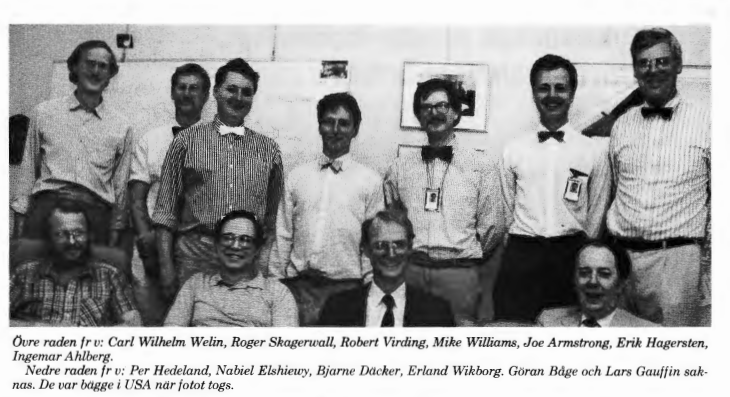100 Years of Erlang
Quinn Wilton / @wilton_quinn / quinnwilton.com

Joe Armstrong, 1950 - 2019















The Computer Science Laboratory Team, circa 1988


Joe Armstrong, A History of Erlang (2007)
of the many inventors of technical improvements in that historic period, most have remained anonymous. Few names have been recorded in the history of the telephone, most of them being completely unknown.
- Robert Chapuis, 100 Years of Telephone Switching (2003)


The Boardman Building, first commercial telephone exchange

George Willard Coy

Notes about George W. Coy, University of Connecticut Library


Hello Alexander.
Hello Watson!

Notes about George W. Coy, University of Connecticut Library
The first telephone directory

ELLEMTEL CS Lab Directory (as of 1994)


Blueprint of Coy's Exchange


An early exchange, modeled after Coy's, in Bridgeport, Connecticut

Western Electric "Standard" Switchboard



Almon Strowger

Bjarne Däcker

New-York tribune, December 7, 1919

The Bamberg herald, February 27, 1913

Strowger, at the height of his paranoia

The Bamberg herald, February 27, 1913

The Bamberg herald, February 27, 1913

Strowger's nemesis. Probably.

The Bamberg herald, February 27, 1913

Up four, and over three

The Bamberg herald, February 27, 1913


Step-by-Step Switch
Step-by-Step Switch, front

New-York tribune, December 7, 1919


Patent for the "Two-Motion Strowger Switch"
Strowger Sunburst Dial, circa 1903


AE 40 Monophone, circa 1940s

circa 1902



Abbeville Press and Banner, January 6 1892
New-York tribune, December 7, 1919


Western Kansas World, November 5th 1892
A wall of two-motion selectors in a central office

New-York tribune, December 7, 1919


If you wish to make an erlang from scratch, you must first invent the uniselector
- Carl Sagan





From chapter 13: "Programming Telephony", in "New Concepts in Parallel Programming"

Ivar Jacobson







defmodule Phone do
def idle() do
receive do
:off_hook ->
start_tone()
getting_number()
{:seize, pid} ->
send(pid, :seized)
start_ringing()
ringing_b_side()
end
end
defp getting_number() do
receive do
...
end
end
defp ringing_b_side() do
receive do
...
end
end
defp start_tone(), do: ...
defp start_ringing(), do: ...
end
phone = spawn(&Phone.idle/0)
send(phone, :off_hook)



Magnus Fröberg

Joe philosophizing, 1985
This seemed to me at the time a quite reasonable request—though I now realise that it was far more difficult than I had imagined
- Joe Armstrong, A History of Erlang (2007)

Joe Armstrong, A History of Erlang (2007)





Joe Armstrong, Making reliable distributed systems in the presence of software errors (2003)




influenced_by(elixir, erlang).
influenced_by(elixir, clojure).
influenced_by(elixir, ruby).
influenced_by(erlang, lisp).
influenced_by(erlang, plex).
influenced_by(erlang, prolog).
influenced_by(erlang, smalltalk).
influenced_by(clojure, lisp).
influenced_by(clojure, erlang).
influenced_by(clojure, haskell).
influenced_by(clojure, java).
influenced_by(clojure, prolog).
ancestor_of(X, Y) :- influenced_by(Y, X).
ancestor_of(X, Y) :-
influenced_by(Y, Parent),
ancestor_of(X, Parent).



Atom
Atom
Functor





Strand: New Concepts in Parallel Programming, 1990








UBF(B) specification for an IRC server
(types omitted for space)


Joe Armstrong, Erlang Mailing List (2016)

Joe Armstrong, Erlang Mailing List (2016)




Research Roadmap for STARDUST

I have this idea in which we’ll connect all of the worlds Erlang systems to each other, imagine if every process could talk to every other process, world-wide!
- Joe Armstrong




Abbeville Press and Banner, September 28, 1892
100 Years of Erlang
By quinnwilton
100 Years of Erlang
- 1,019



